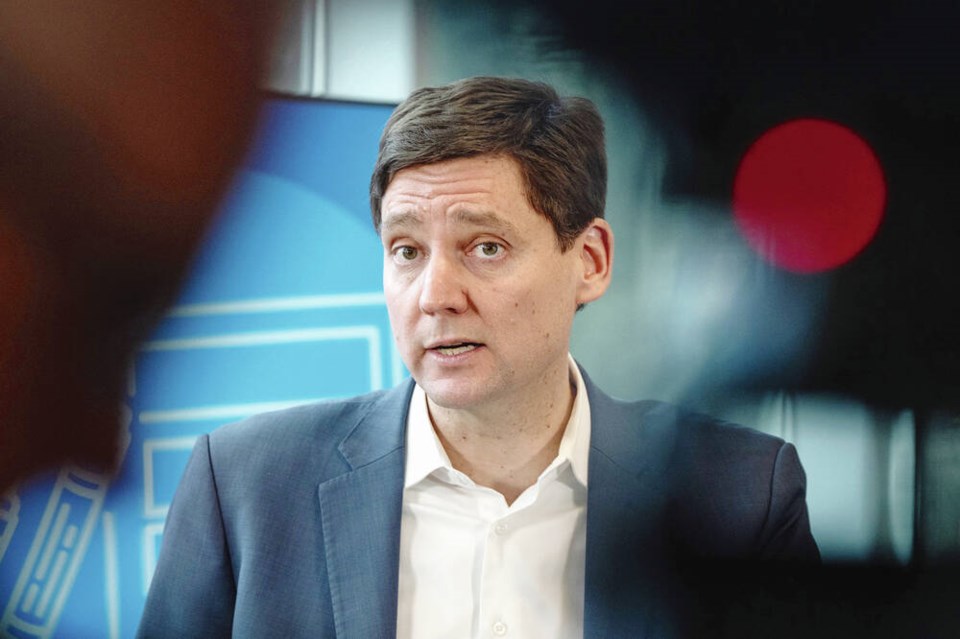There’s no question we lost the “war on drugs.”
It looks like the surrender is not going well, either.
B.C.’s historic drug decriminalization experiment is being dramatically scaled back as the NDP government retreats in the face of sustained public anxiety about what it is doing to perceptions of public safety.
Premier David Eby on Friday announced he wants the federal government to recriminalize hard-drug use in virtually all public spaces. The request is almost certain to be approved.
As well, personal use of drugs is going to be explicitly banned in hospitals, despite repeated reassurances earlier that it was already prohibited. There will be a corresponding big increase in security and staff to enforce it.
Decriminalization will apply only in private homes, shelters or overdose-prevention sites. B.C. is close to going back to square one, where police turned a blind eye to small-quantity use in those situations.
Police, who lost the authority to roust people using drugs from many public spaces, will soon regain it. So families and children exposed to flagrant open drug use might feel safer.
But it amounts to a major retreat from a policy that public health authorities and politicians enthusiastically advocated for years. It’s the worst-case scenario from a policy perspective, given all the experts’ fervent assurances over the years that decriminalization was going to make a huge difference.
The three-year experiment still has 22 months to run — assuming it carries on. But it will be a pale imitation of its initial version. A number of studies were being done on it and they’re rendered mostly useless now. (Eby referred to it in the past tense at a news conference Friday.)
There’s a management practice in some organizations that goes by various names — “red-teaming” is one. Just before a major decision is made, a bloody-minded team not involved in it are brought in to skeptically scrutinize it and tear it apart — in order to make it better.
No doubt there was some final second-guessing on decriminalization before it kicked in last year. But it’s a mystery why no official seems to have seen the potential for the public-safety crisis that ensued. Maybe it’s because almost everyone in all sectors involved supported it. Everybody was on board.
It’s retrospectively telling to look at the 11 guiding principles that the two governments enshrined at the start.
They were mostly about “doing no more harm,” “choice and autonomy,” being trauma-informed, and dealing with racism, reconciliation and decolonization.
“Public safety” was the next to last principle listed. Even if the numbering didn’t indicate priorities, the reference was only to organized crime and disrupting trafficking.
There was no recognition of the potential for wide-open public drug use to become a dominant issue, after wide-open public drug use was decriminalized.
Just a few months into the experiment, dozens of mayors were talking about bylaws to deal with what the province was ignoring. But public-health officials insisted that anything remotely punitive would put lives at risk.
Last September, the province added playgrounds, water parks and skate parks to the skimpy list of areas where drug use was still illegal.
In October, they tried to broaden the prohibition further through legislation. But an activist health group won an injunction in Supreme Court, which cited a high probability of irreparable harm if people with addictions were forced elsewhere. That injunction expired last month, but the court argument will continue.
Now Eby is asking Ottawa to reimpose federal narcotic restrictions far beyond the expansion he tried last fall, in hopes they will work because they have withstood repeated tests in court over the years.
“Clearly from the outset we should have had these authorities in place for police to be able to deal with [public use].”
He said there were legal technical challenges in decriminalizing but maintaining some authority over public use at the same time.
Just So You Know: The enormous amount of faith that was placed in decriminalization stemmed from how unanimous all the experts were.
That started breaking down with senior police leaders’ testimony at federal hearings last week that there was no sign it was working.
They also confirmed widespread diversion of safe-supply drugs, where people with dependencies sell the allotment provided by clinics, or trade up. Eby’s government has denied that for months now. But you have to wonder if safe supply will follow the decriminalization route — a major new, widely endorsed policy that created disastrous unintended consequences and went sideways.



